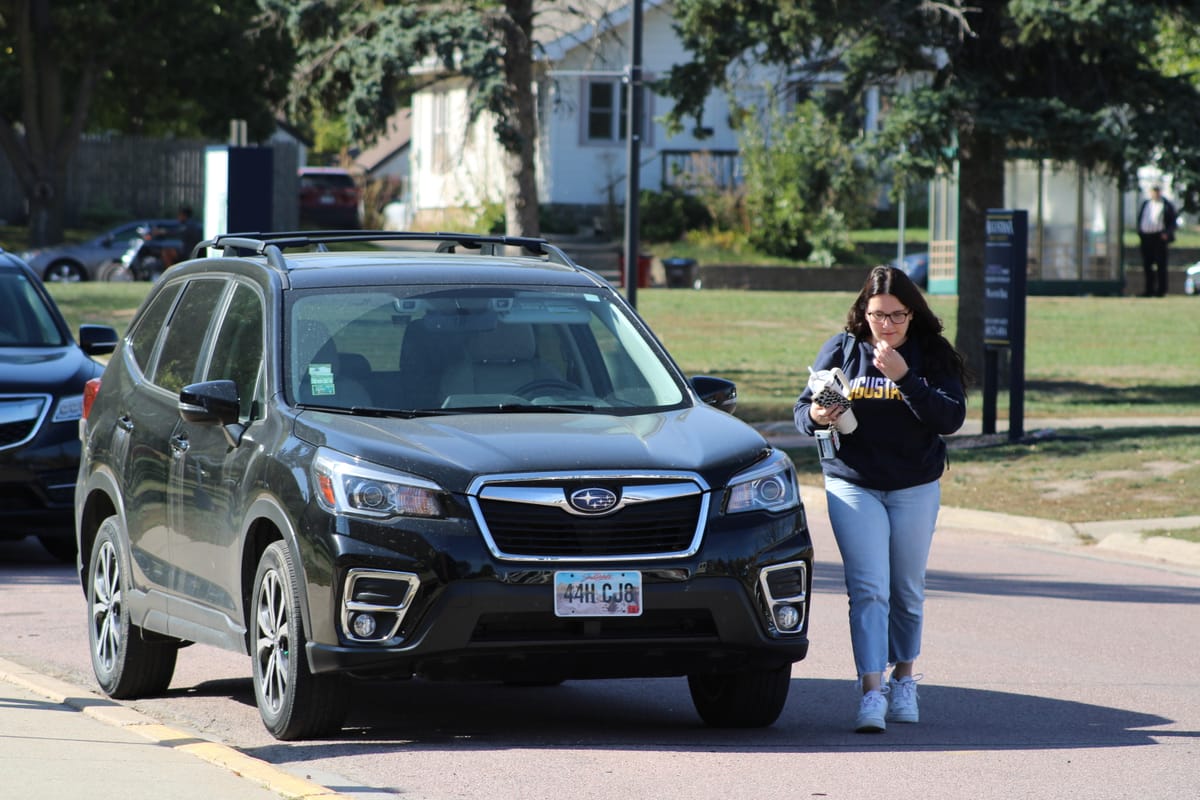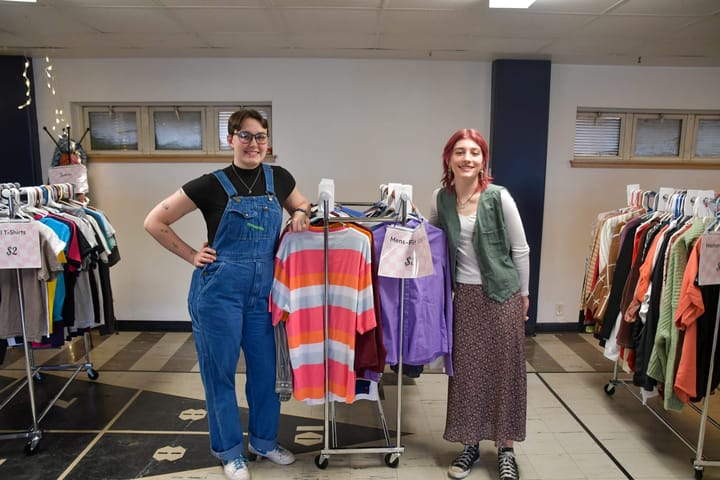Parking troubles build; plans for new lots

Students, faculty and staff reserved 917 parking passes this fall, filling Augustana’s residential and commuter spots. However, as many students report difficulty in finding available parking spots, the university is planning for parking expansion before 2030 under the Viking Bold plan.
In total, the university has 21 parking lots, 14 of which are for residence halls, four of which are for faculty and staff and three of which are for faculty, staff and commuters.
“The campus wasn’t necessarily designed for everybody bringing a car,” Rick Tupper, associate vice president of Campus Safety and logistics, said. “So, we don’t necessarily have a parking spot for everyone who wants a parking spot.”
English professor Debbie Hanson said that last year she could typically arrive before her class started and find a spot either in the Humanities lot or near the archaeology building. This semester, she said she has not found the same parking availability.
“I almost didn’t make it because I spent 20 minutes circling, trying to find a parking spot,” Hanson said.
When Hanson told her class why she was almost late, she said her students agreed that she was not alone in this issue.
Sophomore Zachary Van Meter, a music education major, parks in the Kirkeby-Over Stadium lot but lives in Bergsaker Hall.
“With [Augustana] not having a designated spot for Berg, and just having a parking lot that doesn’t have enough spaces for Solberg alone, with Berg included in that. . . it’s just creating a lot of problems,” Van Meter said.
Last year, Van Meter said he liked having a pass for the three lots on the north end of campus because he could usually find a spot. Now, he said parking in the K.O. lot is frustrating, especially with moving his car for football games.
“Augustana should have enough parking so that you don’t have to move your car every weekend,” Van Meter said.
Junior Hannah Churchill, a government and sociology double major, had a pass for the K.O. lot last year but never used it, as the lot was farther away from her dorm.
“I always got a spot closer to Wagoner [on the street] than the other parking lots, so I thought it would be more worth it to not pay for a parking pass [this year],” Churchill said.
Parking passes were raised $10 this year, meaning residence hall permits cost $235 and commuter or K.O. permits are $185 for the whole school year.
Tupper said Augustana plans to expand the Humanities and Solberg Hall lots, but the date as to when is uncertain.
Shannan Nelson, chief financial officer, said parking expansions will likely either take place in the summer of 2024 or 2025, but President Stephanie Herseth Sandlin said they will be complete by 2027.
“We’re in the very initial phases of looking at what [expanding lots] could look like,” Tupper said. “Right now, I’ve got two companies that are looking at giving me some design work on the Humanities parking lot.”
Tupper said the Humanities lot will expand towards Grange Avenue, and the Solberg lot will expand towards Grange Avenue and 33rd Street, which will cut into the walkway between Bergsaker and Solberg.
“As we look at that project, we would also look at that northeast corner of the intersection, creating some type of landing pad, where you could have a landmark sign or something that would be iconic for people to recognize, in a patio type area that would be connected with that parking lot,” Tupper said.
Tupper said once the hockey arena is complete, 130 parking spaces on the backside of the arena will be available for students living on campus. Tupper said this lot will be treated similarly to the K.O. lot, where students will need to move their vehicles for hockey games.
Tupper said students will be able to park in this lot with a parking pass beginning next fall.
Herseth Sandlin said there’s a possibility of expanding parking where the Fellows’ Presidential Residence on 37th Street and Grange Avenue is or changing parking on the north end of campus.
“If people were willing to change habits, we could possibly make 28th [street] a one-way and create diagonal spacing and create more spaces there,” Herseth Sandlin said. “We may have to get approval from the city; I don’t know now that we own that.”
Tupper said the current state of parking has caused his officers to write many tickets for cars parked illegally.
“I wish [officers] didn’t have to [write so many tickets] because they’ve got other stuff they could be doing,” Tupper said.
He said Campus Safety gives out an average of 1,000 to 1,100 citations every academic year, and the amount of tickets written up depends on whether an officer is available to enforce parking.
“If we’re busy, then we don’t have time to monitor [parking],” Tupper said. “So, it kind of ebbs and flows.”
Tupper said students can request to remove their tickets through the appeal board, which is a student-run group appointed by the Augustana Student Association president each year.
Tupper said last year Campus Safety had 73 appeals; 28 were suspended and 45 were rejected.
Many community members park in the Humanities and Wagoner lots on weekday nights when rehearsals and events are happening on campus. For instance, every Monday night the South Dakota Symphony Chorus and youth orchestra have rehearsals in Humanities.
Junior Erin Micke, a sociology and psychology major, said she has a parking pass for the Wagoner lot but struggles to find a spot in the evening because of the additional people and cars on campus. In October, this issue caused her to get a ticket.
Micke said she returned to campus around 7 p.m. on Oct. 3 to find every parking spot taken. The Humanities and Wagoner lots, the loop around the Commons and street parking on Grange Avenue were all full.
“I finally saw someone pull out of the last possible spot on the Humanities side of the lot, so I parked there, knowing that I’d probably receive a ticket because I wouldn’t be able to move [my car] until 11 [a.m.] the next day after class,” Micke said.
Many Augustana students, like Micke, agree that there needs to be a change in parking on campus but understand it’s not an easy process.
Herseth Sandlin said she hopes adding parking near Humanities will help relieve some of the parking problems, but students should be prepared to walk a few blocks as the city of Sioux Falls and campus grows.
“The convenience factor is one that we all have to get used to as we become a more complex and slightly larger university in a growing city and neighborhood,” Herseth Sandlin said.



